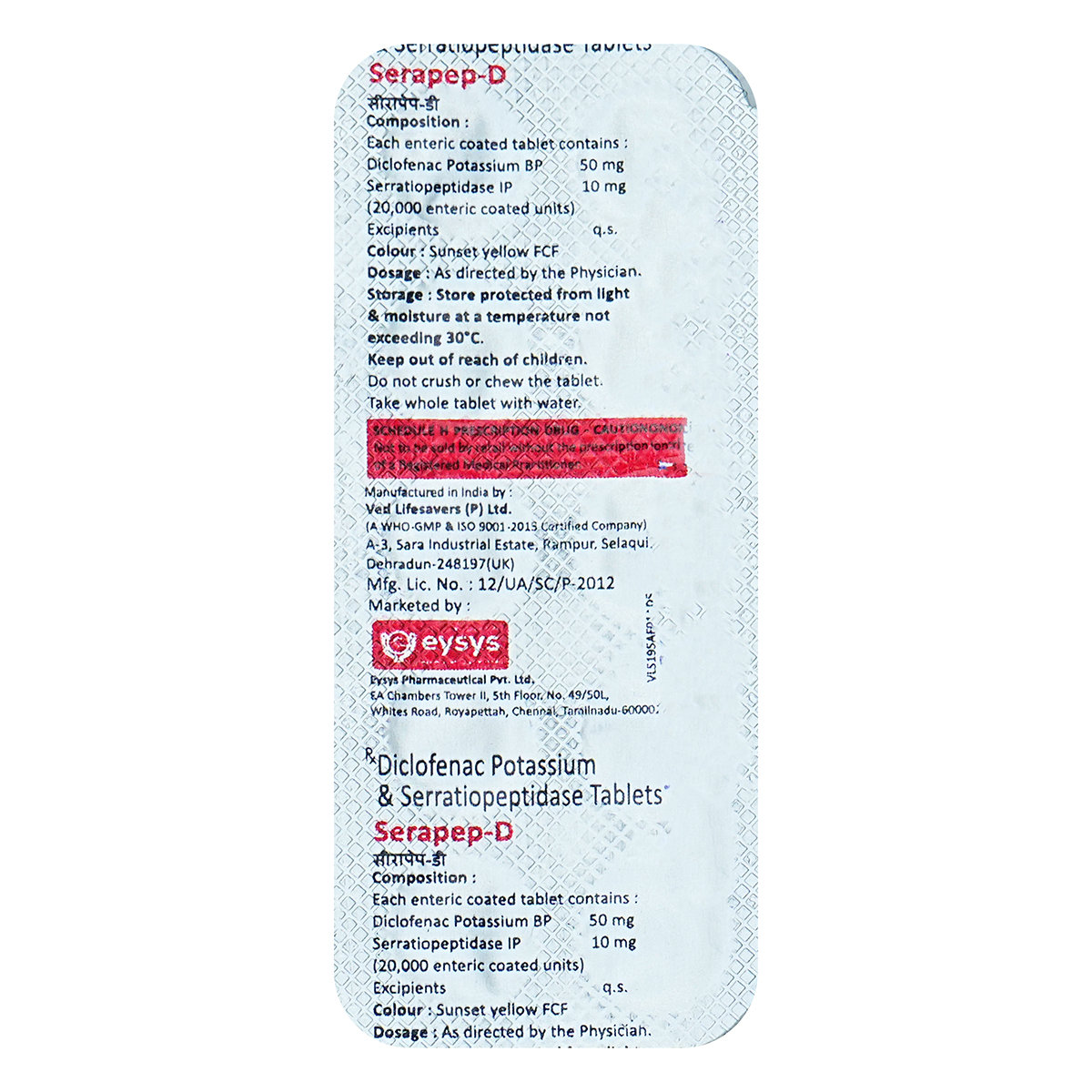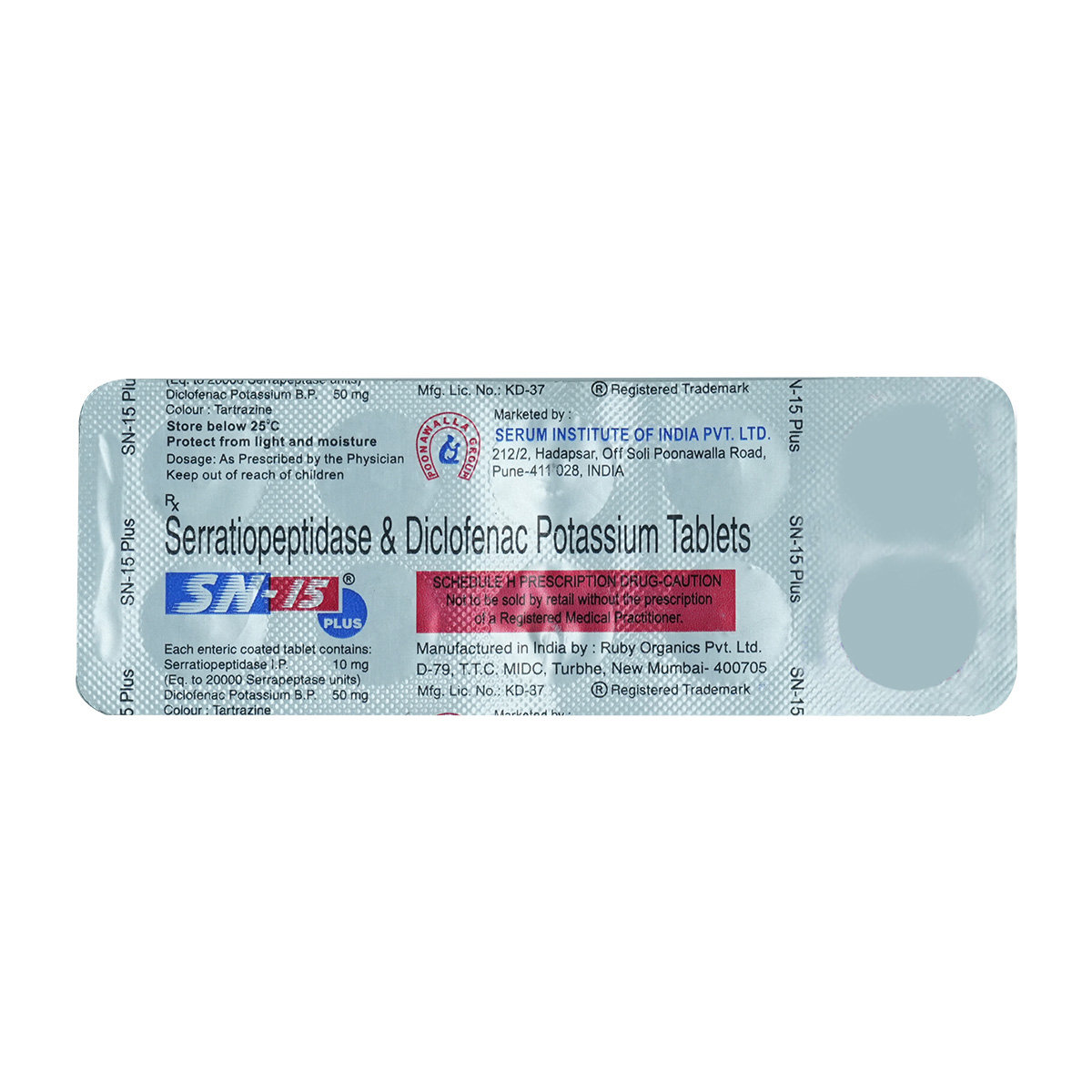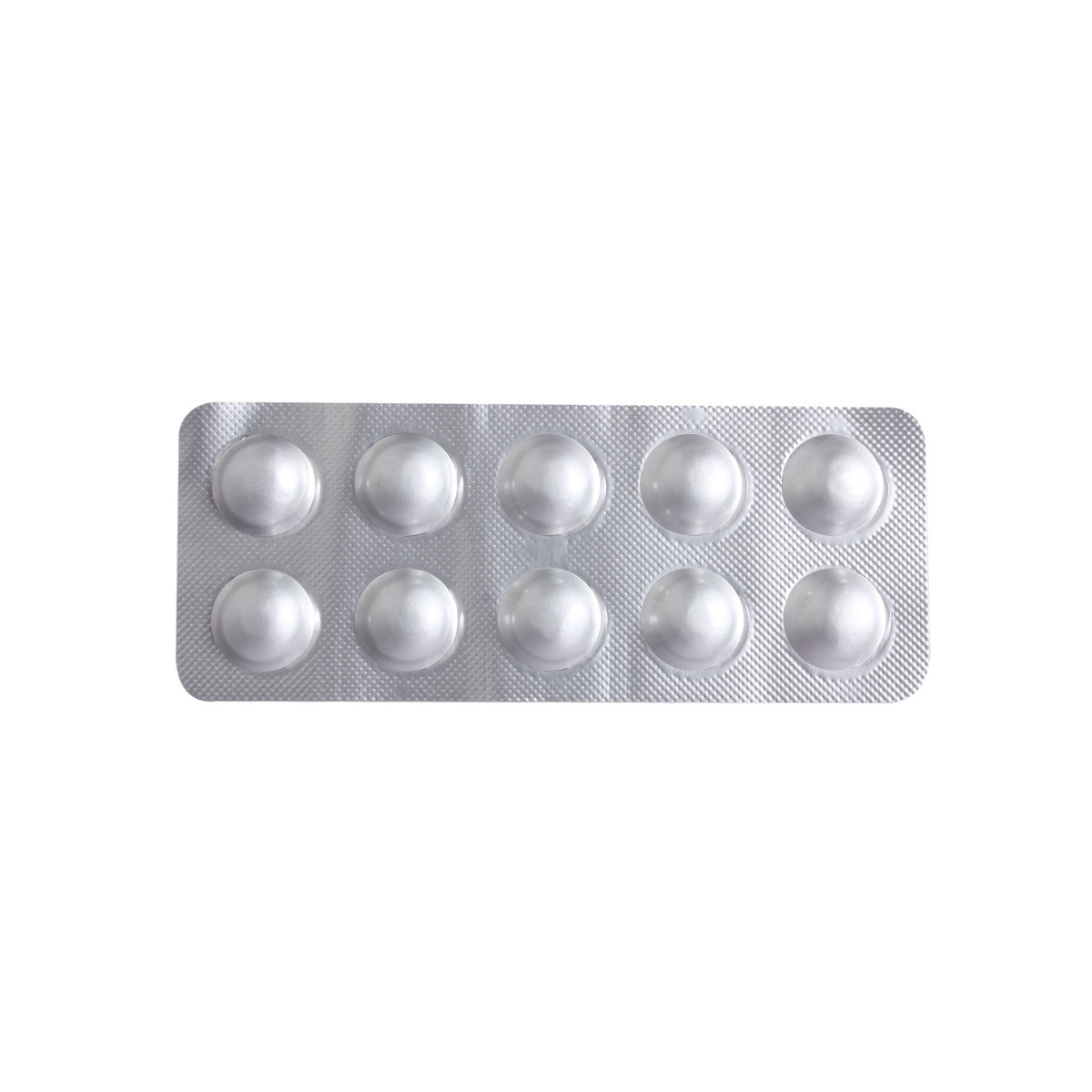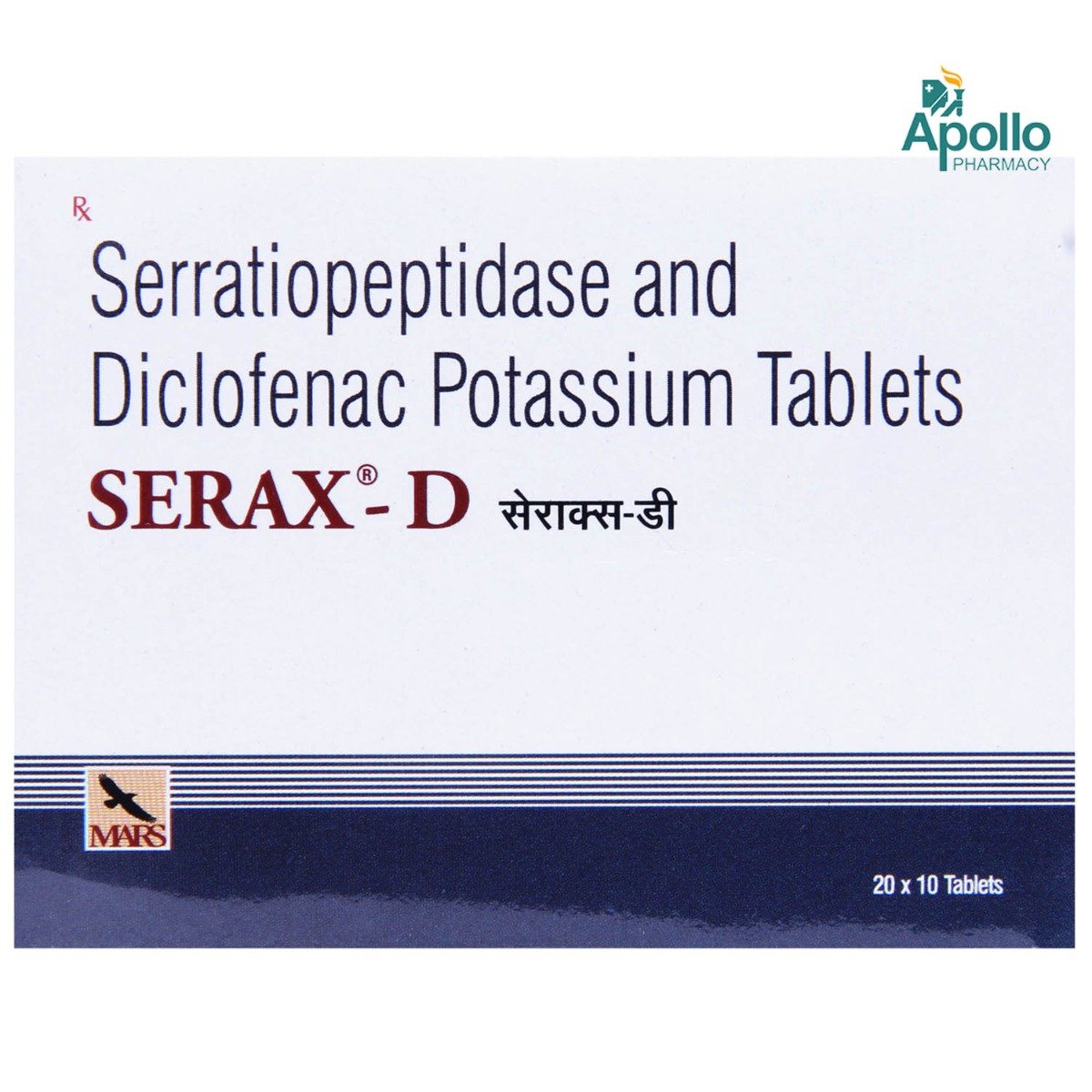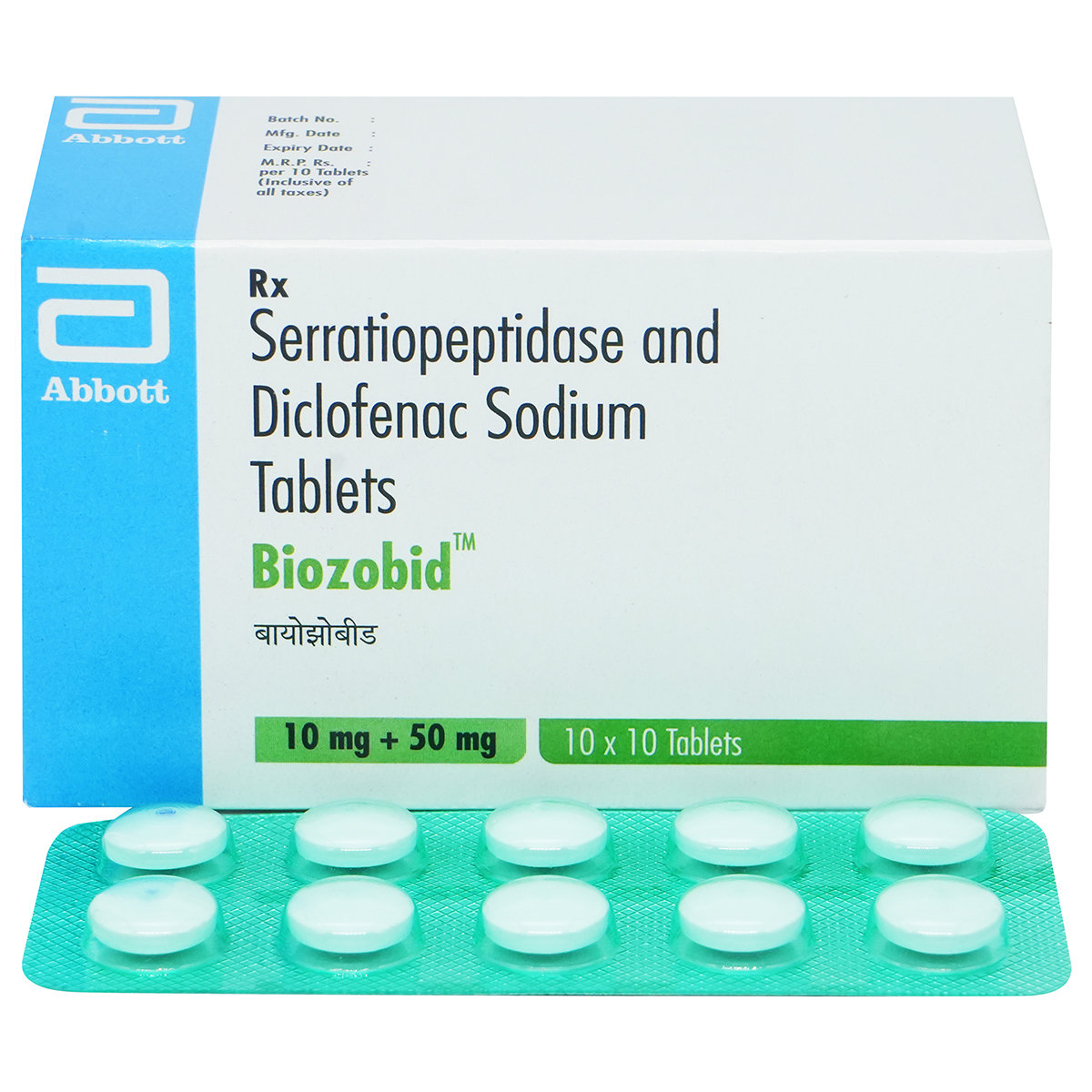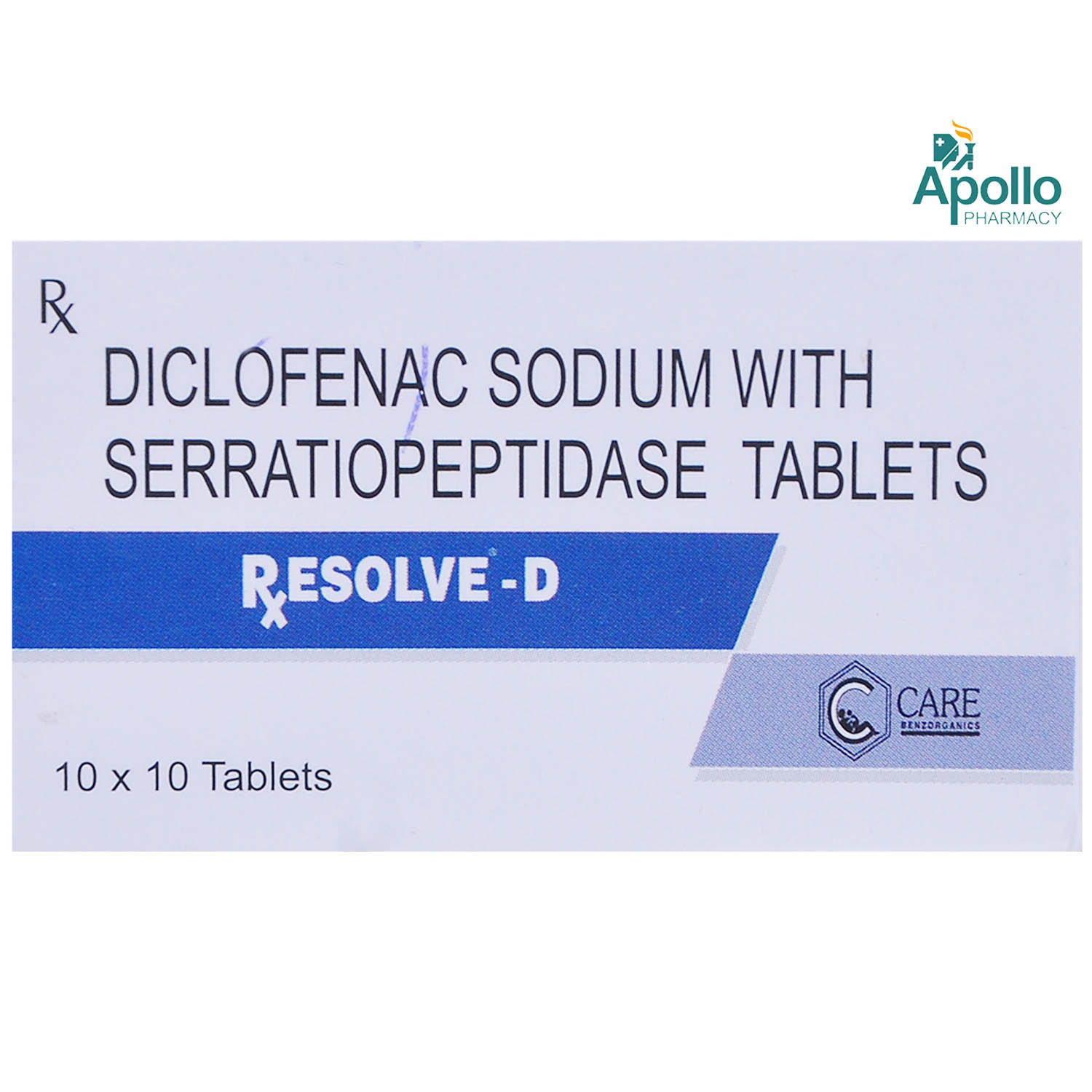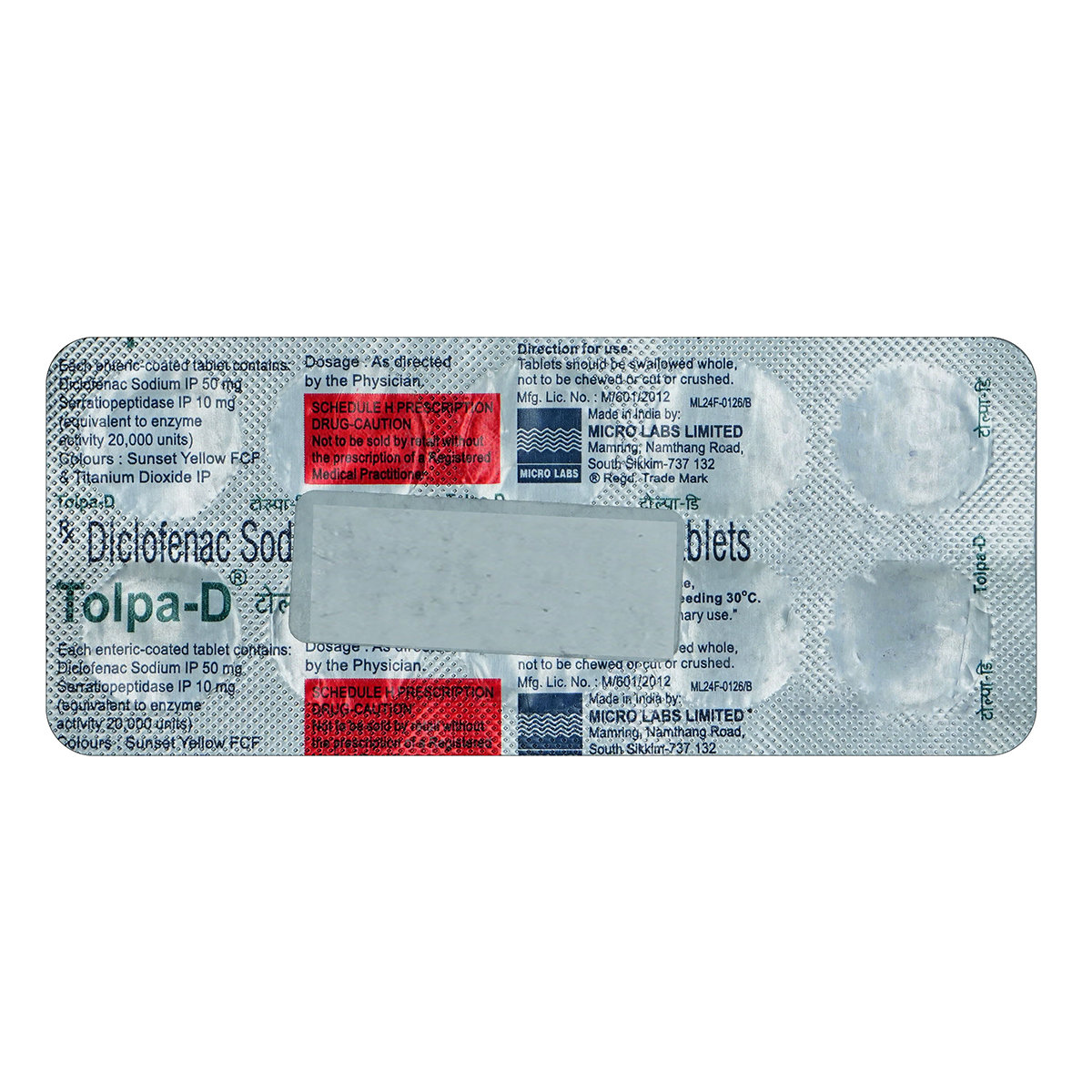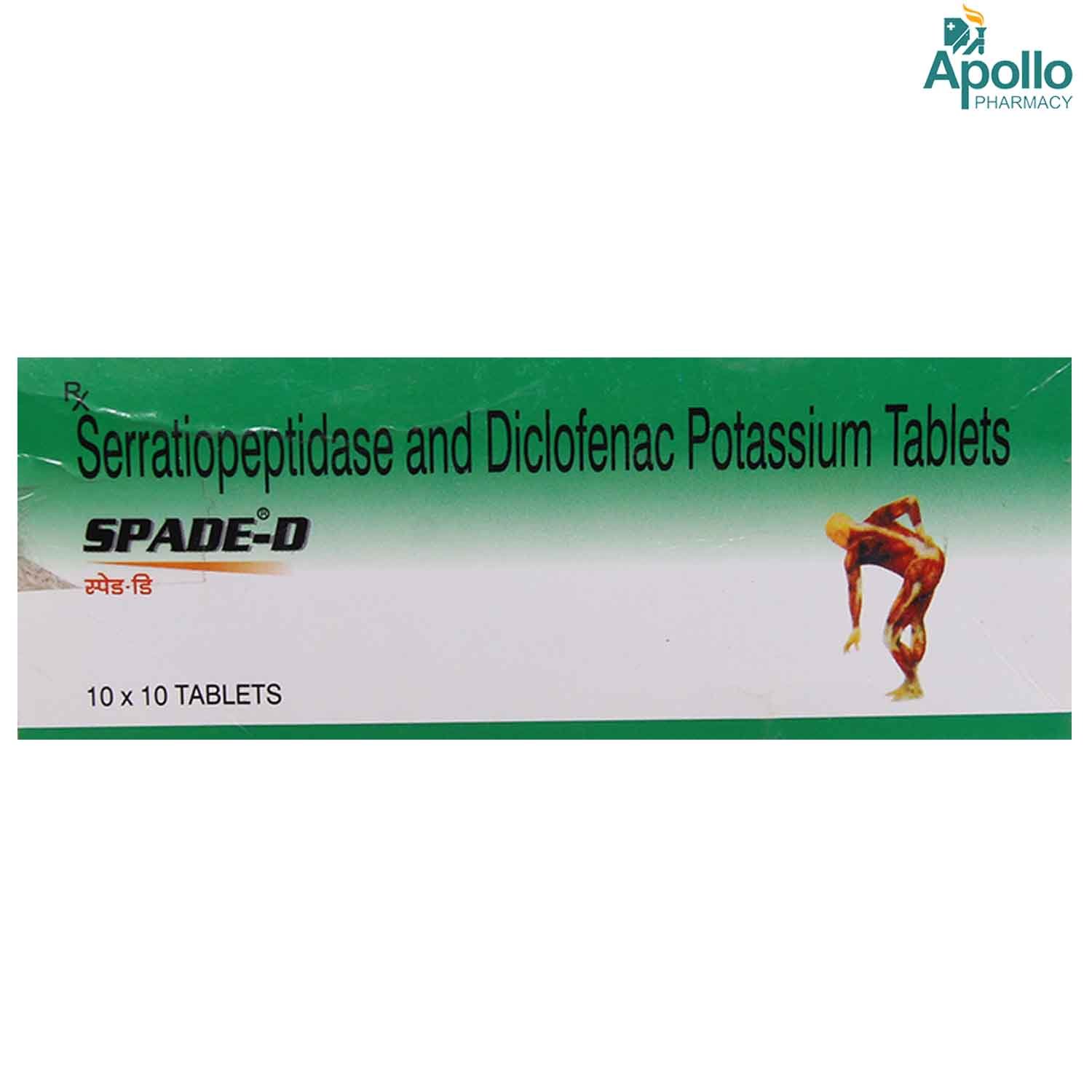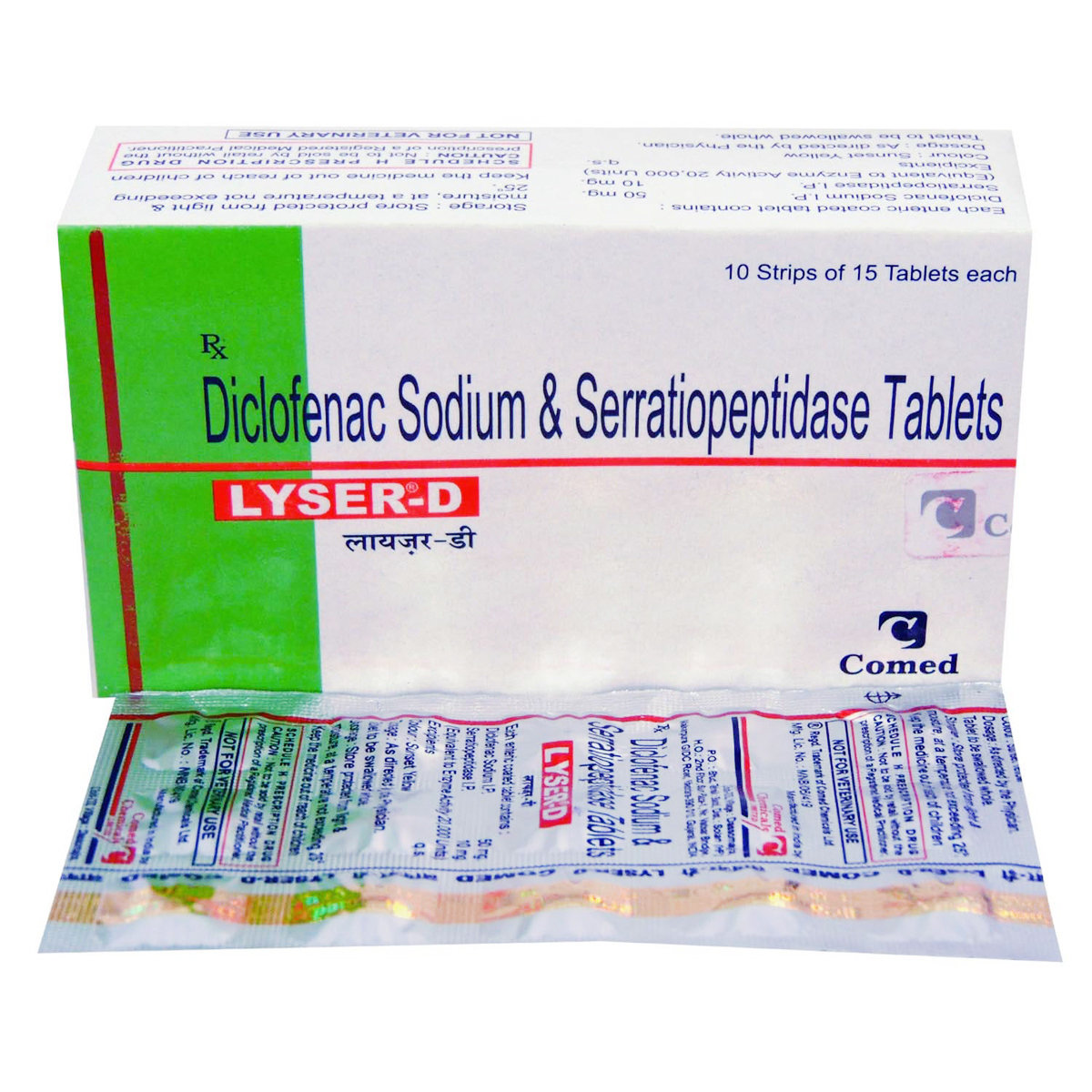- Home
- Dicomid-D Tablet
Dicomid-D Tablet Substitute
Dicomid-D Tablet Substitute
Medicine Composition:
DICLOFENAC-50MG + SERRATIOPEPTIDASE-10MGAll Substitutes & Brand Comparisons
RX
Serapep-D Tablet 10's
Isis Healthcare India Pvt Ltd
₹104
(₹9.36 per unit)
15% COSTLIERRX
SN 15 Plus Tablet 10's
Serum Institute Of India Pvt Ltd
₹109.5
(₹9.86 per unit)
21% COSTLIERRX
Cipzen-D Tablet 10's
Cipla Ltd
₹147
(₹11.03 per unit)
36% COSTLIERRX
Seradic Tablet 10's
Ochoa Laborotaries Ltd
₹124
(₹11.17 per unit)
37% COSTLIERRX
Divon S Tablet 10's
Micro Labs Ltd
₹134
(₹12.06 per unit)
48% COSTLIERRX
Serax-D Tablet 10's
Mars Pharma Pvt Ltd
₹135.5
(₹12.2 per unit)
50% COSTLIERRX
Dyrect Tablet 10's
Ozone Pharmaceuticals Ltd
₹136
(₹12.24 per unit)
51% COSTLIERRX
Biozobid Tablet 10's
Abbott India Ltd
₹169
(₹12.68 per unit)
56% COSTLIERRX
Zinase-D 50 mg/10 mg Tablet 10's
Rapross Pharmaceuticals Pvt Ltd
₹143
(₹12.87 per unit)
58% COSTLIERRX
Resolve-D Tablet 10's
Care Benzorganics Pvt Ltd
₹143
(₹12.87 per unit)
58% COSTLIERRX
Zinase-D 50 mg/10 mg Tablet 15's
Rapross Pharmaceuticals Pvt Ltd
₹234
(₹14.05 per unit)
73% COSTLIERRX
Flanzen D Tablet 15's
Maneesh Pharmaceuticals Ltd
₹234
(₹14.05 per unit)
73% COSTLIERRX
Tolpa D Tablet 10's
Micro Labs Ltd
₹156.5
(₹14.09 per unit)
73% COSTLIERRX
SPADE D TABLET
Med Manor Organics Pvt Ltd
₹157.5
(₹14.18 per unit)
75% COSTLIERRX
Lyser-D Tablet 15's
Comed Chemicals Ltd
₹276
(₹16.57 per unit)
104% COSTLIER

When Should You Consider Switching from Dicomid-D Tablet ?
Patients may explore substitutes in the following scenarios:
- High monthly cost of Dicomid-D Tablet
- Non-availability in local pharmacies
- Generic recommendation by a doctor
- Side effects or better tolerability with alternatives
What to Know Before Switching
Before you switch from Dicomid-D Tablet to another medicine, here are some important points to keep in mind:
Same salt, different brands:
Most substitutes contain the same active ingredient - DICLOFENAC-50MG + SERRATIOPEPTIDASE-10MG, but the fillers, coating, or manufacturing quality may vary slightly.
Consult your doctor first:
Even if the salt is the same, your doctor can confirm if the substitute is right for your condition, dosage, and health history.
Watch out for allergies or reactions:
Some people may react differently to certain brands due to inactive ingredients. If you notice any side effects, inform your doctor immediately.
Price ≠ effectiveness:
A lower-priced substitute doesn't mean it's less effective. Many generic medicines work just as well as branded ones.
Check the dosage form and strength:
Always match the substitute’s strength (e.g., 5mg, 10mg) and form (tablet, capsule, syrup) with what your doctor prescribed.
Uses
Dicomid-D Tablet is used in the treatment of pain. The detailed uses of Dicomid-D Tablet are as follows:
- Relieve pain: Dicomid-D Tablet is used to treat pain in conditions such as osteoarthritis and rheumatoid arthritis, spondylitis and ankylosing spondylitis, dental pain, migraine and tension headaches, soft tissue injuries and menstrual pain (dysmenorrhea).
- Post-traumatic pain: Dicomid-D Tablet is used in the post-traumatic pain (e.g. sprains, strains, fractures).
Medicinal Benefits
Dicomid-D Tablet plays a vital role in reducing pain and inflammation by blocking the release of chemical messengers which cause pain and fever. Dicomid-D Tablet relieves pain and inflammation in arthritic conditions with the benefit of increased antibiotic penetration and micro-circulation at the injury site. Serratiopeptidase present in Dicomid-D Tablet is a proteolytic enzyme which helps in the breakdown of insoluble protein (fibrin) a by-product of blood clots into smaller units. It also causes thinning of the fluids in the body as a result of injury, thereby making fluid drainage smoother in the swollen tissue.
FAQs
The substitutes of Dicomid-D Tablet contain the same active salt(s) - DICLOFENAC-50MG + SERRATIOPEPTIDASE-10MG. However, they may differ in price, manufacturing quality, and inactive ingredients. Speak to your doctor to find a suitable option.
Switching to a generic substitute medicine in the place of Dicomid-D Tablet is often possible if it has the same salt, strength, and dosage form. But always check with your doctor before making any changes to your medication.
Generics versions of Dicomid-D Tablet are typically more affordable because they don’t include the original brand's research, development, and marketing costs. They contain the same active ingredient and are approved for safety and effectiveness.
Most people don’t notice any difference. However, some may react to different fillers or coatings. If you notice any unusual symptoms after switching, consult your doctor.
Make sure the new medicine has the same active salt, strength, dosage form. Always confirm the change with your doctor or pharmacist.
Substitutes of Dicomid-D Tablet meet the same safety and efficacy standards as Dicomid-D Tablet , but small differences in absorption or formulation can exist. A doctor can help you choose the right one for your needs.
Yes. Substitutes of Dicomid-D Tablet may vary in color, size, or shape due to differences in manufacturing and branding, but this does not affect how they work.
Yes, it’s generally safe to switch between multiple substitutes of Dicomid-D Tablet if they have the same salt and strength. However, always inform your doctor so they can monitor how your body responds.
Yes, many people safely use substitutes of Dicomid-D Tablet for long-term treatment. Just ensure it’s done under medical supervision.
If your symptoms stay under control or lab results remain stable, the substitute for Dicomid-D Tablet is likely working well. Regular follow-ups with your doctor are important.
Absolutely. Even with the same salt, small differences can affect how your body responds when switching from Dicomid-D Tablet to its substitute. Always consult your doctor before switching.
Dicomid-D Tablet is used in the treatment of pain and inflammation due to bone or soft tissue injury, resolution of postoperative inflammation, oedema (swollen tissue with fluid) and pain.
Dicomid-D Tablet when taken by patients who are allergic to pain-killers can be harmful. It should also be avoided in person with history of heart failure, kidney or liver disease, stomach ulcers and high blood pressure.
You should only take Dicomid-D Tablet if doctor has prescribed you. The maximum recommended dose of Dicomid-D Tablet is twice daily. Dicomid-D Tablet can be one in the morning and one in the evening.
Rheutamoid arthritis is an autoimmune disease that causes chronic inflammation and pain of the joints.
Ankylosing spondylitis is a arthritis of the spine which can lead to the fusion of the vertebrae, lead to pain and inflammation in the spine.
Yes, Dicomid-D Tablet can cause stomach upset. So, it should be preferably taken with food to avoid it.
Dicomid-D Tablet should be stored in a cool and dry place, away from direct sunlight. Keep the medicine out of reach of children.
Dicomid-D Tablet is generally safe when used as directed by your doctor for short-term pain and inflammation relief. However, you should not use Dicomid-D Tablet if you have a stomach ulcer, gastric bleeding, severe heart failure, stroke, hypertension (high blood pressure), kidney failure, or if you are undergoing dialysis.
Yes, you can stop taking Dicomid-D Tablet once your pain is relieved, but only after consulting your doctor. It is recommended to follow your doctor's advice on the duration and dosage of Dicomid-D Tablet , as stopping the medication too early could affect your recovery.
Yes, the use of Dicomid-D Tablet can cause nausea and vomiting as side effects. Taking it with food may help prevent nausea. If you experience vomiting, try drinking small sips of water or other fluids frequently. If these symptoms persist, please consult your doctor.
Yes, the use of Dicomid-D Tablet may cause dizziness as a side effect in some individuals. Avoid driving or operating machinery if you experience dizziness. If dizziness persists, please consult your doctor.
Yes, Dicomid-D Tablet is contraindicated in patients who are allergic to any of its components, those with kidney failure, or those undergoing dialysis. It should not be taken by patients with a stomach ulcer, gastric bleeding, severe heart failure, stroke, or hypertension (high blood pressure). Also, it should be avoided during the last trimester of pregnancy. Please consult your doctor if you have any concerns while using Dicomid-D Tablet .
No, Dicomid-D Tablet is not generally recommended for stomach pain. In fact, it may cause stomach upset, ulcers, or bleeding. If you have stomach pain, please consult your doctor for a proper diagnosis and treatment.
Yes, long-term or high-dose use of Dicomid-D Tablet , a nonsteroidal anti-inflammatory drug (NSAID), can potentially damage the kidneys. Regular monitoring and caution are advised when using Dicomid-D Tablet , especially in individuals with existing kidney disease. Please consult your doctor before using Dicomid-D Tablet .
Yes, Dicomid-D Tablet can be taken on an empty stomach, but it is generally advisable to take Dicomid-D Tablet with food to reduce the risk of side effects. Always follow your doctor's instructions when taking Dicomid-D Tablet .
Dicomid-D Tablet is generally not recommended for children under 10 years of age unless prescribed by a doctor. Always consult a paediatrician before giving Dicomid-D Tablet to a child, as the dosage may need to be adjusted for them.
Dicomid-D Tablet is intended for short-term use only, as it may potentially cause side effects such as gastrointestinal or cardiovascular issues. Always follow your doctor's advice regarding the duration and dosage.
No, it is generally not recommended to consume alcohol while taking Dicomid-D Tablet as it may increase the risk of side effects, such as stomach irritation, ulcers, and bleeding. Your doctor may advise you to limit or avoid alcohol consumption while taking Dicomid-D Tablet .
Buy best C.n.s Drugs products by
Intas Pharmaceuticals Ltd
Sun Pharmaceutical Industries Ltd
Torrent Pharmaceuticals Ltd
Alkem Laboratories Ltd
Alteus Biogenics Pvt Ltd
Abbott India Ltd
Cipla Ltd
Micro Labs Ltd
Lupin Ltd
Tripada Healthcare Pvt Ltd
D D Pharmaceuticals Pvt Ltd
Ipca Laboratories Ltd
Arinna Lifesciences Ltd
Icon Life Sciences
Linux Laboratories Pvt Ltd
Mankind Pharma Pvt Ltd
Cnx Health Care Pvt Ltd
East West Pharma India Pvt Ltd
La Renon Healthcare Pvt Ltd
Emcure Pharmaceuticals Ltd
Eris Life Sciences Ltd
Leeford Healthcare Ltd
Talent India Pvt Ltd
Consern Pharma Ltd
Tas Med India Pvt Ltd
Macleods Pharmaceuticals Ltd
Zydus Healthcare Ltd
Jagsam Pharma
Troikaa Pharmaceuticals Ltd
Dr Reddy's Laboratories Ltd
Matias Healthcare Pvt Ltd
Ikon Pharmaceuticals Pvt Ltd
Sigmund Promedica
Aristo Pharmaceuticals Pvt Ltd
Ardent Life Sciences Pvt Ltd
Shine Pharmaceuticals Ltd
Zydus Cadila
Theo Pharma Pvt Ltd
Wockhardt Ltd
Lifecare Neuro Products Ltd
Propel Healthcare
Crescent Formulations Pvt Ltd
Mesmer Pharmaceuticals
Matteo Health Care Pvt Ltd
Reliance Formulation Pvt Ltd
Ajanta Pharma Ltd
Morepen Laboratories Ltd
Neon Laboratories Ltd
Capital Pharma
Med Manor Organics Pvt Ltd
Akumentis Healthcare Ltd
Lyf Healthcare
Msn Laboratories Pvt Ltd
Sanix Formulation Pvt Ltd
Pulse Pharmaceuticals
Brainwave Healthcare Pvt Ltd
Hetero Healthcare Pvt Ltd
Cyrus Remedies Pvt Ltd
Sanofi India Ltd
Solvate Laboratories Pvt Ltd
Elder Pharmaceuticals Ltd
Novartis India Ltd
Psyco Remedies Ltd
Medishri Healthcare Pvt Ltd
Quince Lifesciences Pvt Ltd
Alniche Life Sciences Pvt Ltd
Crescent Therapeutics Ltd
Hbc Life Sciences Pvt Ltd
Mova Pharmaceutical Pvt Ltd
Prevego Healthcare & Research Pvt Ltd
Cadila Healthcare Ltd
Tripada Lifecare Pvt Ltd
Alembic Pharmaceuticals Ltd
Kivi Labs Ltd
Solis Pharmaceuticals
Talin Remedies Pvt Ltd
Infivis Life Care
Serotonin Pharmaceuticals Llp
Glenmark Pharmaceuticals Ltd
Aareen Healthcare Pvt Ltd
Trion Pharma India Llp
A N Pharmacia Laboratories Pvt Ltd
Cadila Pharmaceuticals Ltd
Gagnant Healthcare Pvt Ltd
Primus Remedies Pvt Ltd
Vasu Organics Pvt Ltd
Crescent Pharmaceuticals
Glarizonto Pharma Pvt Ltd
Knoll Healthcare Pvt Ltd
Lyceum Life Sciences Pvt Ltd
Wallace Pharmaceuticals Pvt Ltd
Zuventus Healthcare Ltd
Arches Pharmaceuticals
Divine Savior Pvt Ltd
Lia Life Sciences Pvt Ltd
Lincoln Pharmaceuticals Ltd
Maneesh Pharmaceuticals Ltd
USV Pvt Ltd
Corona Remedies Pvt Ltd
Dycine Pharmaceuticals

